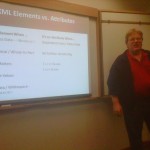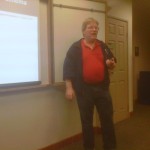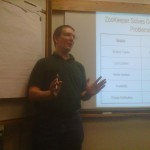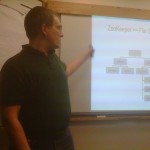March 9th — Web Sockets and Garbage Collection
We will be having the meeting at Lowry (details directly below)
Building 758 Rm. 138-140
1059 Alton Way
Denver, CO 80230
Here’s some additional directional help:
Campus Map:
http://www.cccs.edu/Docs/About/LowryDirectory.pdf
Driving Directions:
http://www.cccs.edu/Docs/About/DrivingDirectionsToLowry.pdf
Look for the building with the UNC signage on it as Bldg 758 might be difficult to see.
Be sure to come downstairs – we will try to have signs posted.
Come learn how to use WebSockets to enable bi-directional
communication between a server and a browser. This will be followed by
a discussion on the internals of Azul’s JVM.
Location: Auraria Campus- King Center Rm. KC 213
Directions to the Auraria Campus can be found on the Denver JUG web site.
5:30-6:00: Food, Soda and Networking
We are grateful to Tek-Systems for their continued sponsorship of the
Food and Soda!
*** BASIC CONCEPTS ***
6:00-7:00: Introduction to WebSockets: All the Bi-Directional
Duplexing You Can Handle!
One of the most exciting new additions to the suite of technology
collectively known as “HTML 5” is an official WebSocket standard. This
finally allows full duplex bi-directional communication between a
client and server over HTTP.
However, the technology is still new and rapidly changing. In this
talk, Johnny will explain what a WebSocket is, how it works, how to
implement it on browsers that don’t natively support it, and how it
relates to other technologies and platforms such as HTTP long polling,
Comet, Flash Sockets, mobile, and JSONP. He’ll also discuss the
different types of server implementations, scaling strategies, and how
a it can be integrated into an existing application.
About Johnny Wey
Johnny Wey currently works at Time Warner Cable as a senior engineer
in the web services group. His work and experience include all layers
of a software application including web properties that see millions
of visitors per month. Other than programming, he enjoys spending time
with his wife and 20 month old son, riding his bicycle, and playing
various musical instruments. He can be found on twitter @johnnywey as
well as on his blog at http://www.johnnywey.com
*** MAIN PRESENTATION ***
7:00-8:45: GC Nirvana High throughput, low latency and lots of state,
all at the same time.
You want your low-latency cake and have high throughput too? For years
Java engineers have debated strategies to improve Java runtimes, but
conventional JVM approaches have always placed low-latency and
high-throughput as mutually exclusive design elements. Add on the
desire for large heaps and youíre pushing engineering pipe dream.
But itís not heresy, just innovation and hard work, that we can now
deliver a JVM that does it all for commodity servers. In this session
weíll bust the myth that JVM performance is limited by either
low-latency or high-throughput design tradeoffs and demonstrate
consistent, low-latency response times with high, sustained allocation
rates using 10s of x86 cores and 100s of GBs of memory
About Mark D. Chisam
With more than 24 years of experience in the development of hardware
and software systems, Mark provides the leadership, and direction for
Azul Systems North American Systems Engineering and Field Consulting
practice. Mark has a proven track record in the specification, design,
and deployment of advanced Java-based systems serving the financial
services, electronic commerce, and government industries.
Prior to Azul, Mark was an Industry Architect and Staff Engineer for
Sun Microsystems. During his tenure at Sun Microsystems, he was
involved with market development engineering projects at key
independent software vendors that used Sun’s Java technology as a
technical component of their software implementations.
*** AGENDA ***
5:30 – 6:00 p.m. Food, and Networking.
6:00 – 7:00 p.m. Basic Concepts/First Session
7:00 – 7:15 p.m. Announcements
7:15 – 8:45 p.m. Main/Featured Presentation
8:45 p.m. Door prizes
*** SPONSORS ***
Thanks to our Denver JUG sponsors for
supporting the Java community:
– TekSystems for providing food and drink at the meeting
http://www.TekSystems.com/
– Bolder Staffing and Bolder Professional Placement for sponsoring our books for door prizes.
http://bp2recruiting.com/
– ReadyTalk for sponsoring food at Old Chicago after the meeting
http://www.ReadyTalk.com
– Metropolitan State College Dept. of Mathematics and Computer Science
http://math.mscd.edu/
– EvolutionHosting for providing our web hosting
http://www.evolutionhosting.com
Door Prize sponsors:
– SoftPro for a Gift certificate towards the purchase of a book
http://softpro.stores.yahoo.net/index.html
– JetBrains (1 JetBrains product)
http://www.jetbrains.com/
– O’Reilly Media (sent books to give away)
http://oreilly.com/
– ZeroTurnaround (JavaRebel)
http://www.zeroturnaround.com/




